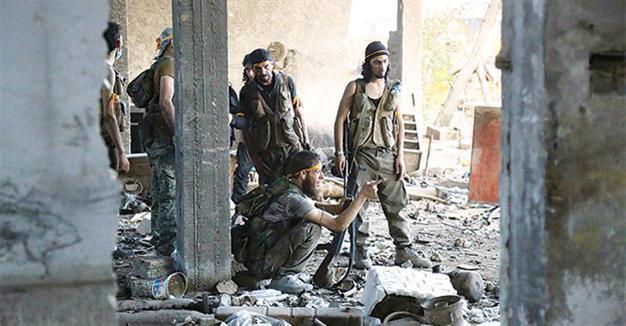Two million under siege in Aleppo, UN alarms

Rebel fighters speak during clashes with regime forces in Ramussa on the southwestern edges of Syria's northern city of Aleppo on August 6, 2016. AFP photo
More than two million people in Syria’s Aleppo are in danger of coming under total siege, the United Nations has warned, calling for immediate access to the heavily bombed city.Ferocious fighting has rocked divided Aleppo in recent weeks, with rebels and regime forces seizing rival access routes and cutting off residents.
In a statement on Aug. 8, the U.N.’s top humanitarian official in Syria, Yacoub El Hillo, and regional coordinator Kevin Kennedy called for a “humanitarian pause” in the hostilities, AFP reported.
Two million people in the city are living in fear of besiegement, including up to 275,000 people trapped in east Aleppo, the statement said.
The fighting in Aleppo is reported to have killed at least 130 civilians since the end of July, and has damaged hospitals, clinics, and the city’s power and water networks.
“The U.N. stands ready to assist the civilian population of Aleppo, a city now united in its suffering,” the statement read.
“At a minimum, the U.N. requires a full-fledged cease-fire or weekly 48-hour humanitarian pauses to reach the millions of people in need throughout Aleppo and replenish the food and medicine stocks, which are running dangerously low.”
Fighting in Aleppo, Syria’s former economic powerhouse, flared in late June when government forces closed in on the Castello Road, the last route into rebel-held parts of the city.
The road was severed in mid-July, sparking food shortages and skyrocketing prices in the eastern districts.
In a major push last week, a coalition of rebels, Islamists, and jihadists cut off the regime’s own main access road on the southern edges of the city.
Each side has used their newly acquired territory to bring food and other supplies into neighborhoods of the city they control, but the roads are still not safe for civilians to use.
“When used to intentionally deprive people of food and other items essential to their survival, siege tactics constitute a war crime,” the U.N. statement said.
More than 290,000 people have been killed since Syria’s conflict erupted in March 2011.
Forces from both sides send reinforcements to Aleppo
Syrian regime forces and rebel factions sent hundreds of reinforcements to Aleppo Aug. 8 as both sides braced for a crucial battle to control the country’s second city.
Rebel forces on Aug. 7 announced a bid to capture all of Aleppo city, which if successful would mark the biggest opposition victory yet in Syria’s five-year civil war.
But forces loyal to Syrian President Bashar al-Assad are putting up a fierce fight and have begun pouring in reinforcements.
The main opposition coalition said Monday it was only a matter of time before rebels take all of Aleppo, but the United States warned there would be no quick victory.
The Syrian Observatory for Human Rights said some 2,000 pro-regime fighters from Syria, Iraq, Iran and Lebanese Shiite movement Hezbollah had arrived in Aleppo since late Aug. 7.
“Both sides are amassing their fighters in preparation for the great battle of Aleppo,” Observatory head Rami Abdel Rahman said.
Meanwhile, the U.S. said that the United Nations Security Council must not allow civilians on both sides of Aleppo to be cut off from humanitarian aid, while Russia accused Washington of politicizing a humanitarian issue, Reuters reported.
The United States, Britain, France, New Zealand and Ukraine organized an informal Security Council meeting on Aleppo on Aug. 7 with briefings by a “White Helmet” rescue worker and two U.S.-based doctors from the Syrian American Medical Society who recently returned from Aleppo.
“If the fighting continues it is conceivable that civilians on both sides of Aleppo could be cut off from the basic assistance they need. We cannot allow this to happen,” U.S. Ambassador to the United Nations Samantha Power said.
Russian Deputy U.N. Ambassador Vladimir Safronkov accused the United States and its western colleagues of politicizing a humanitarian issue, urging them to “admit that the main cause of all of the humanitarian problems in Syria is not the counter-terrorist actions by the legitimate government of Syria.
“The propaganda and the emotional rhetoric, the unfounded accusations, the information campaign, means that we cannot move toward a political settlement in Syria,” Safronkov said.
















